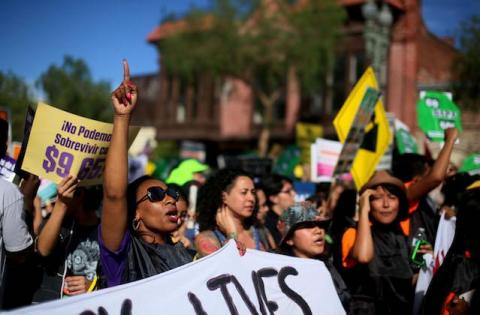The UCLA Labor Center defines wage theft as the unlawful practice of not compensating workers for all of their labor. This includes not paying minimum wage or overtime, and requiring work off the clock. In the most extreme cases, as in during the post-Hurricane Katrina Gulf Coast reconstruction, it means not paying workers at all.
How wage theft happens is a story woven together by legal loopholes, limits in oversight, enforcement, and legal remedies, and historical and institutional racism borne by Black and Brown workers.
The Fair Labor Standards Act (FLSA) is the cornerstone of America’s modern labor laws, and among its provisions are establishing minimum wage and overtime pay. Franklin Delano Roosevelt signed the FLSA into law in 1938, a feat that required significant compromises to garner the votes of Southern Democrats. These compromises were blatantly racialized, rooted in an objective of preventing African-Americans from gaining economic or political power. How this played out is that traditional Black labor sites—in the fields and in homes—were exempted from FLSA protection, namely agricultural and domestic work. Decades later, after sustained organizing by civil rights and women’s rights advocates, the FLSA was amended to cover most farm workers and domestic workers, in 1966 and 1974 respectively. The one significant exception to the latter sector is homecare workers, which organizations like the National Domestic Workers Alliance are fighting to change.
Fixing these legal loopholes, however, has not fixed the problem. In fact, the National Employment Law Project describes the country as “experiencing a wage theft epidemic of staggering proportions.” One reason for this is that loopholes still exist—restaurant workers, for example, are classified as “tipped workers” who are entitled to far below the federal minimum wage based on the theory that their tips will fill the gap. Taxi drivers are not entitled to overtime pay. Add to this the highly vulnerable workforce of undocumented laborers, including what Professor Llezlie Green Coleman calls exploitation “at the intersection” to describe undocumented Latinx workers’ experiences as layered in vulnerabilities based on ethnicity, gender and immigration status. The majority of undocumented workers in the U.S. are in lower-skill, low-wage jobs, and so it may not come as a surprise that half of the undocumented workforce—6.5 million of the approximately 11 million undocumented workers in the United States—experience wage theft annually. According to the Economic Policy Institute (EPI), workers across status and sectors lose $50 billion a year for not being paid what they are owed. The EPI study goes on to make a powerful comparison:
It is useful to compare the cost of these wage and hour violations with crimes that are better recognized and greatly more feared, though they are much smaller in their overall dollar impact. All of the robberies, burglaries, larcenies, and motor vehicle thefts in the nation cost their victims less than $14 billion in 2012, according to the FBI’s Uniform Crime Reports. That is well over one-third of the estimated cost of wage theft nationwide.
A problem of such magnitude is matched, unfortunately, with inadequate means to combat it. Among the issues are significantly fewer investigators in the state and federal labor departments than are necessary and inadequate penalties even for willful and repeat violators. In response, cities and states across the country have passed their own laws to prevent wage theft. The Los Angeles ordinance, for example, created a new Office of Wage Standards to enforce wage and hour violations. And Houston passed a law rendering companies with a record of wage theft ineligible for city contracts. On the federal level, in March of this year several Congress members introduced “The Wage Theft Prevention and Wage Recovery Act” to address many of the barriers to meaningfully tackling wage theft, but the legislation has not gained traction.
Boosting economic security for the most vulnerable workers in our society is good policy. As we continue the national dialogue about income inequality and economic recovery, combating wage theft should be a priority.
Anita Sinha is an assistant professor of law and the director of the International Human Rights Law Clinic at American University's Washington College of Law (WCL). Prior to joining the WCL faculty in 2012, Sinha spent more than a decade litigating and advocating on behalf of indigent communities. She began her career as a Skadden Fellow with the Northwest Immigrant Justice Project, and in the aftermath of Hurricane Katrina Professor Sinha led civil rights litigation and human rights advocacy on behalf of displaced New Orleans residents. As a clinical teacher, she has supervised students on U.S. immigration cases, as well as transnational and international projects.


Spread the word